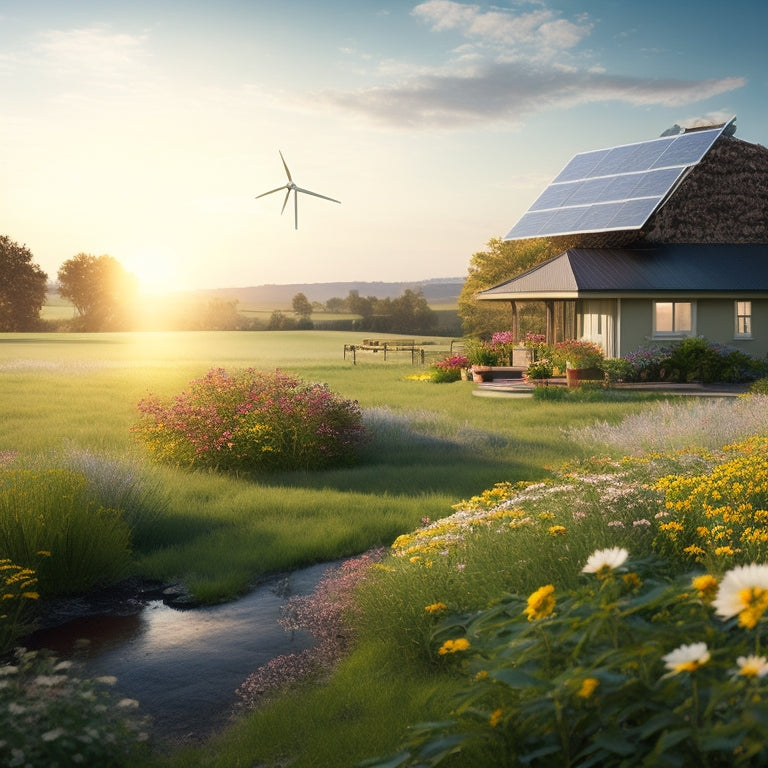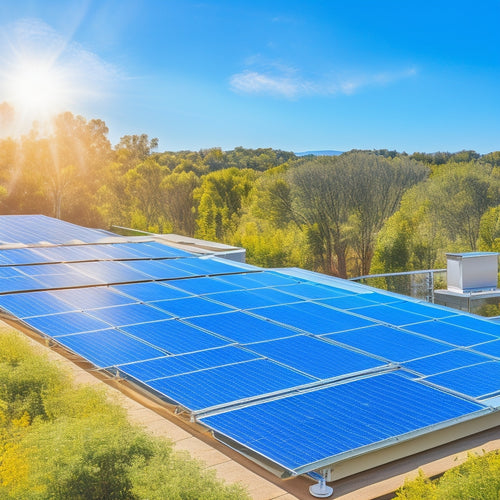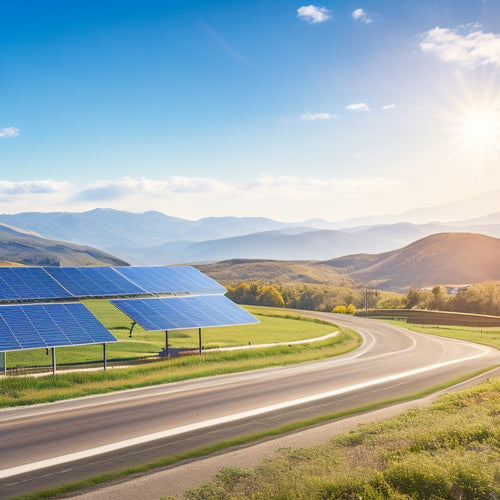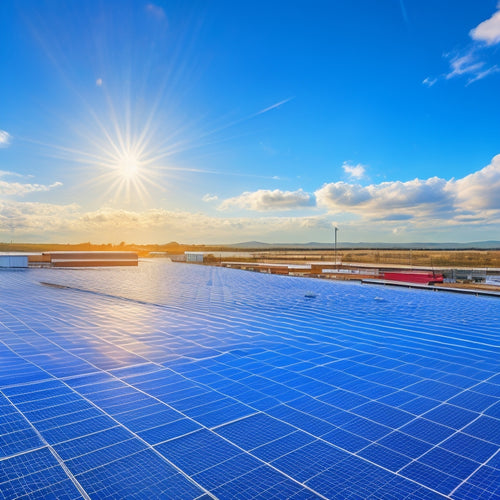
3 Essential Tips for DIY Renewable Energy Systems
Share
When setting up a DIY renewable energy system, you'll want to get it right from the start. First, choose the right solar kit by considering your energy requirements, budget, and installation constraints. Next, size your battery backup correctly by calculating your daily energy usage and factoring in outage duration. Finally, prioritize safety when installing your system by wearing protective gear, following proper grounding techniques, and disconnecting power sources. By following these essential tips, you'll be well on your way to a safe, efficient, and cost-effective renewable energy setup, and exploring the details of each step will guarantee a seamless shift to energy independence.
Key Takeaways
• Consider your energy requirements and budget to size your solar panel array and ensure a suitable system for your needs.
• Ensure system compatibility by selecting matching components, including high-efficiency solar panels, to maximize energy production.
• Regularly maintain your battery backup by checking its state of charge, voltage, and temperature to extend its lifespan and ensure peak performance.
Choosing the Right Solar Kit
When selecting a solar kit, you need to take into account your energy requirements, budget, and installation constraints to make sure you choose a system that meets your specific needs. Your energy requirements will determine the size of the solar panel array you need. Consider your daily energy consumption and the amount of energy you want to offset with solar power.
Next, evaluate your budget to determine how much you can afford to spend on your solar kit. Be sure to consider not only the upfront cost but also the long-term savings and payback period.
Installation constraints, such as available roof space and local building codes, will also impact your solar kit choice.
Solar panel efficiency is another important factor to take into consideration. Look for panels with high efficiency ratings to maximize energy production. Additionally, ensure system compatibility by choosing components that work seamlessly together. This includes selecting an inverter that matches your panel's voltage and current output.
Sizing Your Battery Backup
Now that you've selected a suitable solar kit, it's time to determine the right battery backup size to guarantee a reliable and efficient energy storage system. This critical step ensures your DIY renewable energy system can handle your energy needs during periods of low sunlight or power outages.
To size your battery backup correctly, you'll need to perform a load calculation. This involves calculating your total daily energy usage in watt-hours (Wh) by adding up the power consumption of all your appliances and devices. Consider the maximum number of hours you want your battery backup to provide power during an outage, and factor in the depth of discharge (DOD) to make sure you don't over-discharge your batteries.
Proper battery maintenance is also vital to extend the lifespan of your batteries. Regularly check your batteries' state of charge, voltage, and temperature to prevent damage and ensure peak performance.
Installing Your System Safely
To guarantee a safe and successful installation, you'll need to take precautions to avoid electrical shock, fire hazards, and other risks associated with handling high-voltage equipment and batteries. When working with electrical systems, it's important to understand the risks involved and take necessary safety measures.
Here are some essential safety tips to keep in mind:
-
Wear protective gear: Gloves, safety glasses, and a face shield can protect you from electrical arcs and flying debris.
-
Establish proper grounding techniques: Make sure your system is properly grounded to prevent electrical shock and equipment damage.
-
Disconnect power sources: Before starting work, disconnect power sources to the equipment and batteries to prevent accidental starts or electrical shock.
-
Use insulated tools: Insulated tools can prevent electrical shock and reduce the risk of injury.
-
Follow manufacturer instructions: Always follow the manufacturer's instructions for installation, maintenance, and repair to ensure safe and proper operation.
Frequently Asked Questions
How Do I Ensure My System Complies With Local Building Codes?
You'll guarantee code compliance by researching local building codes, obtaining necessary permits, and scheduling inspections; carefully follow the permit process, and be prepared for inspections to avoid costly rework and ensure your system meets regulations.
Can I Install a DIY Renewable Energy System in a Rented Property?
'Will you be able to harness the power of renewable energy in a rented property? You'll need to get your landlord's approval, and review your rental agreement to make sure it allows for DIY installations.'
What Kind of Maintenance Is Required for a Renewable Energy System?
You'll need to perform regular scheduled inspections to guarantee your renewable energy system operates efficiently, and consider system upgrades to optimize performance, maximize energy output, and extend its lifespan.
Can I Sell Excess Energy Back to the Grid?
You can sell excess energy back to the grid through net metering, earning grid credits that offset your energy bills; this process allows you to generate revenue from your renewable energy system.
Are There Any Government Incentives for DIY Renewable Energy Systems?
As you navigate the renewable energy landscape, you'll find government incentives shining like beacons, guiding you towards savings. You can harness tax credits and Federal grants to fuel your DIY project, reducing costs and amplifying your eco-friendly impact.
Related Posts
-

What Types of Solar Energy Devices Are Available
You'll find several types of solar energy devices available today, each customized to different energy needs. Photovo...
-

Is Switching to Green Energy Solutions Easy
Switching to green energy solutions isn't just easy; it's also beneficial. You can greatly cut utility costs and enjo...
-

Commercial Solar Energy
As you consider powering your business with commercial solar energy, you'll uncover it offers a triple benefit: signi...


